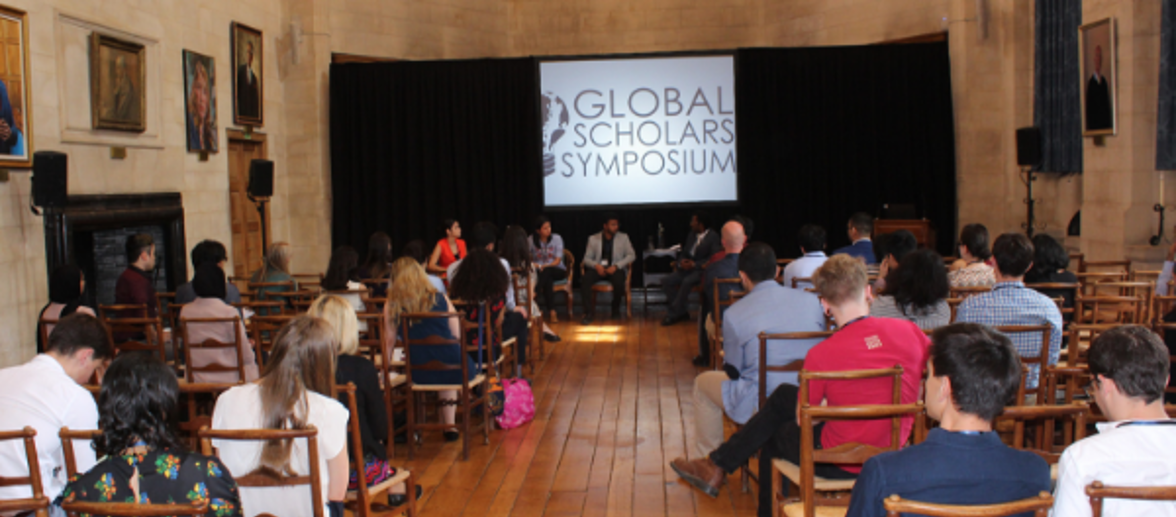In June 2019, Rhodes House hosted the Global Scholars Symposium. The theme was Cultivating Innovation. Over the two-day event, speakers from all over the world talked about different ways to innovate. I left the event with a newfound appreciation for innovators, and several take-home messages.
According to the dictionary, to innovate is to “make changes in something established, especially by introducing new methods, ideas, or products.” One of the biggest takeaways from the conference was that innovation can happen in almost all areas of life. Previously, I believed that innovation was limited to technology. But the conference addressed innovation in terms of culture, religion, medicine, politics and law.
Here are a few of the most interesting takeaways:
- Innovation is Global
In a panel discussion, Natalia Norori, Carla Grados and Ramit Debnath presented a variety of different ways that developing nations are currently innovating for the service of medical treatment and drug delivery, education and technological change.
In resource-constrained regions of the world, innovation is more important than in the developed world. Developing countries use innovation to bypass expensive infrastructure spending. Ramit Debnath provided the example of medical drug delivery in remote regions of Africa, currently being serviced through Coca Cola’s distribution network.
Scholars in developing nations are relying on new innovations to gain access to expensive university resources, according to Natalia Norori. The traditional academic journal system, blocked behind paywalls and subscription fees, are often out of reach of resource-constrained institutions. The solution is open access publishing, an innovation that sees academic articles released for free online, available to all.
- Innovation is Cultural
Omar Saif Ghobash, UAE ambassador to France, discussed the unique potential for innovation in the Middle East. Innovators there face threats from transnational companies overseas, buying local companies and forming monopolies. But at the same time, there are opportunities for innovation in technology, culture and social practices.
With the right kind of support, innovators in the Middle East can challenge monopolies using anti-trust and anti-monopoly laws. There is the chance to use the legal system itself to innovate and change cultural norms and social practices.
These opportunities are not, however, without risk. Any innovation in the Middle East must pay particular attention to existing social, religious and political doctrine.
- Innovation is Changing the Future
Lynne Marlor, VP of the Bank of New York Mellon, discussed the threat posed by new technologies, upending the way we do business, sell products and live our daily lives. She pointed to new innovations in credit card use, artificial intelligence, virtual reality and innovation in financial services as key examples. These changes have created a period of uncertainty, with many unsure what kinds of jobs will exist in the future, and what kinds of innovation will happen next.
Dr Friederike Otto discussed the ongoing risk of climate change, drawing from her research on extreme weather events. The literature presented seemed to suggest that most extreme weather events (that have been studied) are linked to climate change. The clearest link can be drawn from droughts and severe wild fires, which have increased in recent years as temperatures have risen. The task now is for innovators to find new solutions to the problem of climate change, including new technologies, political reformation and legal changes.
- Innovation Can Change the World
Shai Reshef, founder of the University of the People, discussed how innovation can change the world by providing education to the disadvantaged. The University of the People is a unique project that aims to provide tuition-free, distance-based accredited education to disadvantaged students from all over the world. Courses are currently offered in computer science and business administration, among other areas.
One of the biggest advantages of the University of the People is its connection to those undergoing personal hardship. Reshef conveyed his joy that 600 refugees had taken up courses at the university. The unique approach of providing tuition-free learning, means that the barriers to entry are significantly lower, providing access to thousands of students who otherwise would not receive a higher education.
As fully accredited degrees, the University of the People has gone beyond similar ideas (such as MOOCs), to give students online the same opportunities as traditional university students.
Josh Krook is a lawyer and PhD candidate at the University of Adelaide in Australia and has been in Oxford as a visiting student


